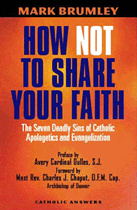“We need a new apologetic, geared to the needs of today, which keeps in mind that our task is not to win arguments but to win souls. Such an apologetic will need to breathe a spirit of humanity, that humility and compassion which understand the anxieties and questions of people.” – Pope John Paul II
In Pope John Paul II’s apostolic letter “At the Beginning of the Third Millennium”, he called for a ‘new evangelization’. This evangelization was to breathe fresh life and a renewed spirit into the world, particularly to those peoples who were once Christian but who had drifted from faith.
One facet of the Pope’s call was a revival of apologetics, the defense and explanation of Church teaching. In the third millennium, the advent of the Internet opened the door for this apologetical revolution. Writings from church fathers and Saints were introduced online. Quality explanations of Church teaching could be found by anyone accessing a search engine. And professional apologists, authors, and teachers began springing up across the world.
In light of this surging interest in apologetics, Mark Brumley, now the President of Ignatius Press, wrote a book titled “How Not to Share Your Faith” (Catholic Answers, 123 pages, paperback). The book wasn’t written to provide specific apologetical arguments–those can be found elsewhere–but instead focuses on the dangers apologists face.
Brumley calls these dangers the Seven Deadly Sins of Apologetics:
1. Apologetical Gluttony – A failure to respect the limits of what apologetics can accomplish.
2. Reducing the Faith to Apologetics – Looking at all or most spiritual matters “apologetically”.
3. Confusing the Faith with Our Arguments for It – Reducing the Faith to our own particular arguments for it.
4. Contentiousness – Going out of your way to look for areas of disagreement.
5. Friendly Fire –Battling Protestants and other absolutists instead of non-Christians and relativists.
6. Trying to “Win” – Aiming to ‘win’ an argument, even at the expense of bringing people to truth.
7. Pride – Thinking more highly of one’s apologetical abilities than one should.
Like all Church teaching, though, Brumley’s admonitions are not fundamentally No’s. He offers corresponding Yes’s for each No, Virtues for each Deadly Sin. For instance, while denouncing the reduction of faith to apologetics, Brumley encourages prayer and meditation. Instead of trying to “win” arguments, Brumley advocates hope and charity, among other apologetical virtues.
“How Not to Share Your Faith” teaches everyone who shares their faith to do so charitably. Every Christian will find this book somewhat applicable because every Christian talks about faith to some degree. However, Brumley’s book holds special importance for those explaining or defending the Catholic faith on a regular basis, either as an amateur apologist or a professional.
Anyone who discusses faith issues through blogs or comment box discussions would do well to consider Brumley’s advice. This book should be required reading for all Catholics on the Internet.
Participating in the “new evangelization” requires that we communicate the ‘good news’ of Christ with humility and compassion. Presenting truth without these virtues makes us nothing more than a resounding gong. If you know the content of the faith but want to communicate it more charitably, I highly recommend “How Not to Share Your Faith”.
“Win an argument, lose a soul.” – Archbishop Fulton Sheen
I wrote this review of How Not To Share Your Faith for the Tiber River Blogger Review program, created by Aquinas and More Catholic Goods, your source for Oplatki and Advent Calendars. For more information and to purchase, please visit Aquinas and More Catholic Goods.

